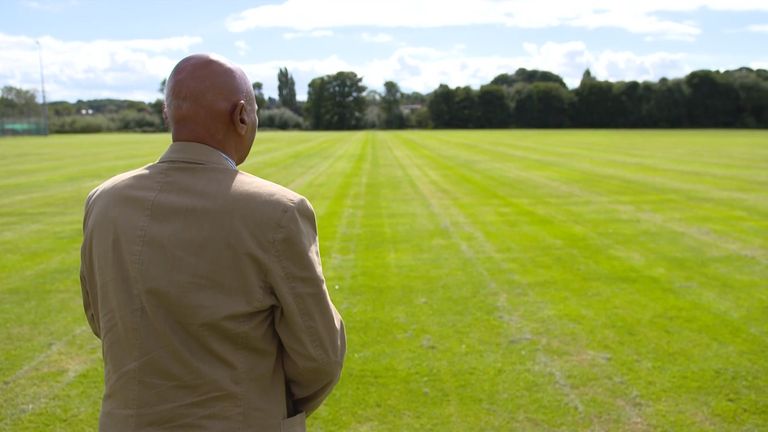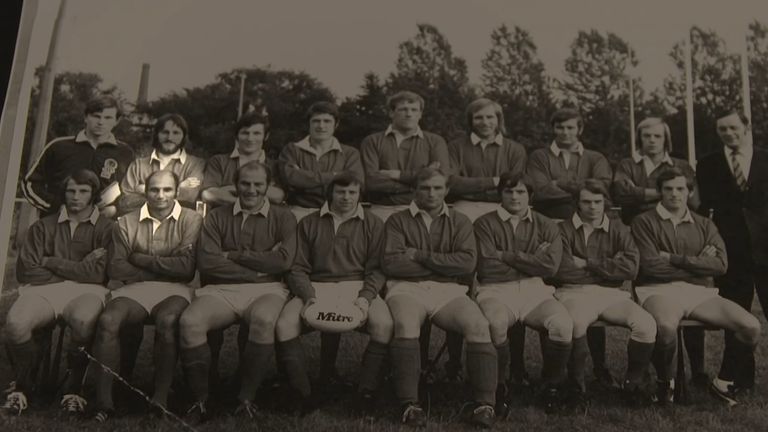Paul Irons talks about his father Eric Irons OBE, racism and rugby
"There was hate mail, even death threats, including from the Ku Klux Klan in America"

Friday 2 October 2020 18:16, UK
As soon as I drove through the gates, I was transported back to my childhood, as a pupil at Fernwood School in Nottingham. I was there to meet up with a man who had helped give me a lifelong love of rugby union: my former games teacher, Paul Irons, who, after nearly 50 years of service is now Chair of Governors.
Paul is a legend of the Nottingham Rugby Club, having starred there on the field in the 1970s. His father, Eric, came to the city from Jamaica to join the RAF during the Second World War and stayed to marry a local girl, Nell, both settling down to not only start a family but to tackle the racial inequalities in post-war Britain.
Paul inherited many of his father's qualities, not least his modesty, but was happy to relay the family's story which, of course, resonates powerfully with Black Lives Matter. I hope you find Paul's words as humbling and inspiring as I did when I had the privilege to listen to his voice once again on those playing fields…
Eric Irons had bravely served his adopted country but the Britain he and his wife Nell found post-war was one where racism played an ugly role. "I know in those early years it wasn't easy because there weren't many black people around in Nottingham."
"As a mixed-race couple, they would get comments and stares," says Paul, one of the six Irons children who grew up seeing their parents having to overcome prejudice. Fired by blatant inequality in society, Eric became one of the leading campaigners for black people's rights in the 1950s. "There would be notices in the houses saying no blacks, no Irish," adds Paul, "there was also a colour bar by some of the big industries in Nottingham…City Transport refused to hire black conductors or black drivers."
Eric successfully obtained more equal opportunities for black employees at his own workplace, the Chilwell Ordnance Depot, and helped set up a consultative committee that met regularly at the Irons' family home seeking to establish lines of communication with those in positions of power making decisions based purely on race.
The 1958 riots in the St. Ann's district of Nottingham served to amplify just how serious things were. Paul explains how the riots started, "There were different stories but the main one was that a black man was talking to a white woman and some of the white men took offence…it was a frightening time…it made the national newspapers. You were literally talking hundreds and hundreds of black men against white men…it was dynamite for a number of days."
Eric was one of those who helped to calm things down, being so central to the process that the press dubbed him 'Mr. Fixit'. "He did have leadership qualities, he was an extremely determined man who stood no nonsense but he also had a clarity of view and clarity of expression…he didn't set out to look for faults, he just set out to look at how can we solve this, hence talking to both sides."
Paul's father did not stop there though as he devoted his life to serving the community in pursuit of social justice and equality for all. In 1962, Eric made national headlines again when he was appointed as Britain's first black magistrate. Accolades inevitably followed and were a source of great pride to the family but, sadly, not everybody saw Eric's appointment in a positive light. "There was hate mail, even death threats, including from the Ku Klux Klan in America," adds Paul.
It is hard to imagine what that must have felt like for the young son and his siblings. "Not wanting to feel sorry for myself, but as a teenage person you've already got your doubts and your concerns…all of a sudden I had to make up my mind, was I black, was I white? What was I?" says Paul. "Being a mixed-race pupil, I had to come to my own resolution…I resolved it by saying I wasn't going to let the colour of my skin dictate the rest of my life. So, I simply said, 'I'm Paul Irons' and took out of all that the accolades… my father said to always concentrate on the positives because if you concentrate on the negatives you will go nowhere and all that will do is demean you."
In recent times, Eric's work has been recognised in Nottingham with a plaque at the old Shire Hall Courts, now the National Justice Museum. In addition, the 'Rebel City' initiative saw Nottingham Forest Football Club place banners in the stands on match day representing seven great Nottingham 'rebels'.
Eric Irons stood proudly alongside Robin Hood, Brian Clough, the suffragette Helen Watts, Ned Ludd, founder of the Luddite movement, and writers DH Lawrence and Alan Sillitoe.
Paul's own sporting prowess is still remembered in the city too and he remains Nottingham Rugby Club's third-highest try scorer. In the 1972/73 season, he amassed an incredible 32 tries but, as the decade went on, Paul's teaching career was taking off. However, he did have the honour of playing for an International XV at the opening of the new stadium in rugby, the home of the birth of the sport.
In that match, the Nottingham star played alongside greats like England's David Duckham and Wales' Tom David. Paul certainly has no regrets, "I've still got lifelong friends in the sport from 50 years ago and we meet up for a reunion and, of course, nobody was better than us when we get together!" But, did he experience any racism in his playing days?
"The vast majority of my experience was very positive. There was, once or twice, not from the players, but from spectators, where I heard one or two not nice comments… but, again, using my philosophy, I put that to one side."
Paul's message on racism today is clearly one that his father Eric would have endorsed, "Black lives do matter. I think some people don't get it but I am very optimistic because there are far more white people now involving themselves, supporting, clearly showing that they resonate with the general message and realise that there is inequality still, even though there has been some advancement.
And, to those who don't get it and say 'white lives matter', of course, white lives matter, all lives matter, but, at the moment, what is happening is people are being asked to put themselves in black people's shoes and concern themselves with redressing this imbalance which there still is…all I want now is politicians and, particularly, the government to take it seriously and not just have another inquiry…to genuinely involve themselves. And, for those who are more elderly and are still resistant and claim racism doesn't exist, come and talk to me, come and talk to some other black people because, otherwise, how do you know?".
Paul's life in education has now seen nearly 50 years of service to Fernwood School, from teacher to governor. The Paul Irons Building at the school stands as recognition of his immense contribution. Typically, this leads to Irons family embarrassment but Paul knows it is the inclusivity at the school which would make his parents most proud, "When I first came in '71 we had two black boys and one Asian girl, now we have 1,100 students with roughly half of those being ethnic minority pupils…the atmosphere, the friendliness is there for all to see and, to me, that's the greatest pride that we should have in Fernwood School."





